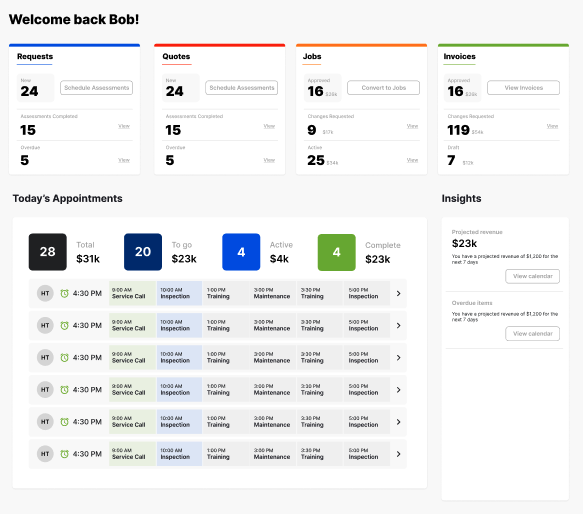CRM Customer Management: Key to HVAC Business Success
Discover how CRM Customer Management and Field Service Management (FSM) drive HVAC business success. Learn about the benefits, key features, and real-world statistics of CRM systems tailored for HVAC companies. Explore how solutions like Flowcarve enhance customer relationships and operational efficiency.
Duration:
Published on June 30, 2024
In today's competitive HVAC industry, or in any field service industry, customer relationship management (CRM) systems are becoming increasingly vital. As HVAC businesses strive to enhance customer satisfaction and streamline operations, the role of CRM customer management cannot be overstated. This blog will explore how CRM, combined with Field Service Management (FSM), can drive HVAC business success, providing insights into its benefits, key features, and implementation strategies.
Understanding CRM Customer Management
Definition of CRM
CRM, or Customer Relationship Management, refers to a set of practices, strategies, and technologies that companies use to manage and analyze customer interactions and data throughout the customer lifecycle. The goal is to improve customer service relationships, retain customers, and drive sales growth.
Importance of CRM in Business
CRM systems offer several advantages to businesses, including improved customer relationships, enhanced efficiency, and data-driven decision-making. For HVAC companies, these benefits translate into better service delivery, increased customer loyalty, and higher profitability.
Specific Relevance to HVAC
In the HVAC industry, where customer service and efficient operations are critical, CRM systems play a crucial role. They help manage customer interactions, streamline scheduling and dispatching, and provide valuable insights into customer preferences and trends.
Integrating CRM with Field Service Management (FSM)
Definition of FSM
Field Service Management (FSM) involves coordinating field operations through a mobile workforce. At its core, FSM entails scheduling service orders, dispatching technicians, tracking job status, and managing invoices and payments.
Benefits of Integrating CRM with FSM
Integrating CRM with FSM systems like Flowcarve enhances the capabilities of HVAC businesses by providing a comprehensive view of customer interactions and field operations. This integration ensures that all customer data and service history are centralized, making it easier to manage and deliver exceptional service.
Start using Flowcarve for your Service Business for FREE!
- Easy quote to invoice generation
- Easy scheduling and dispatching process
- Employee management
- Free service online store for your business
- And more...
Benefits of CRM Customer Management for HVAC Businesses
Improved Customer Relationships
CRM systems enable HVAC companies to maintain and improve customer relationships by providing personalized service and follow-ups. For example, an HVAC business can use CRM to track customer service history and preferences, ensuring tailored and timely communications.
Enhanced Efficiency and Productivity
CRM automates and streamlines various tasks, improving overall business efficiency. By utilizing CRM for scheduling and dispatching, HVAC companies can optimize technician deployment, reducing downtime and increasing productivity.
Data-Driven Decision Making
CRM systems provide valuable insights and data for decision-making. HVAC businesses can analyze customer preferences and trends to offer better services and target marketing efforts more effectively. According to a report by Nucleus Research, CRM applications can deliver an average ROI of $8.71 for every dollar spent.
Key Features of a Good HVAC CRM System
Customer Tracking and Management
A robust HVAC CRM system should offer features for tracking customer interactions and managing customer data efficiently. This includes recording service history, communication logs, and customer preferences.
Scheduling and Dispatching
Effective scheduling and dispatching tools are essential for HVAC businesses. CRM systems help optimize technician schedules, reducing travel time and ensuring timely service delivery.
Invoicing and Payments
CRM systems streamline invoicing and payment processes, reducing administrative workload and improving cash flow. Features such as automated invoicing and online payment options enhance convenience for both the business and its customers.
Reporting and Analytics
Reporting and analytics features provide HVAC businesses with valuable insights into their operations. CRM systems can generate reports on service performance, customer satisfaction, and financial metrics, helping businesses make informed decisions.
Implementing CRM in Your HVAC Business
Choosing the Right CRM System
Selecting a CRM system tailored to HVAC needs is crucial. Consider factors such as ease of use, customization options, integration capabilities, and vendor support when choosing a CRM system. Flowcarve, for instance, offers specialized features designed for HVAC businesses, ensuring seamless operations.
Integration with Existing Tools
Integrating CRM with existing business tools and software ensures seamless operations. For instance, linking CRM with accounting software can streamline financial management, while integration with scheduling tools can enhance operational efficiency.
Training and Support
Proper training and ongoing support are essential for successful CRM implementation. Ensure that your staff is well-trained in using the CRM system and that there is continuous support available to address any issues.
Real-World Statistics
CRM Impact on Customer Retention
According to Salesforce, implementing a CRM system can improve customer retention rates by as much as 27%.
CRM and Revenue Growth
A report from Grand View Research states that the global CRM market size was valued at USD 43.7 billion in 2020 and is expected to expand at a compound annual growth rate (CAGR) of 10.6% from 2021 to 2028.
FSM Efficiency
Capterra undertook a field service software survey, which showed that 82% of organizations adopting FSM solutions saw an increased rate of first-time fixes, and a 90% rise in actual conversations from quotes.
Final Thoughts
CRM customer management is key to HVAC business success. By leveraging CRM systems, HVAC companies can improve customer relationships, enhance efficiency, and make data-driven decisions. As the HVAC industry continues to evolve, adopting CRM technology, particularly when integrated with FSM systems like Flowcarve, will be essential for staying competitive and achieving long-term growth.
If you're looking to take your HVAC business to the next level, consider implementing a CRM system tailored to your needs. Explore CRM solutions like Flowcarve for 30 days FREE after you sign up to streamline your operations and enhance customer satisfaction.
Additional Digest
